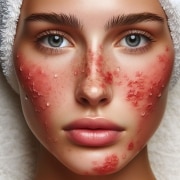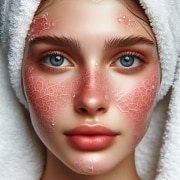What are some natural ways to combat dry skin during menopause and thyroid disease?
If you’re experiencing dry skin due to menopause or thyroid disease, it can be frustrating and uncomfortable. However, there are several natural remedies and lifestyle changes that can help alleviate the symptoms and improve the health of your skin. In this blog post, we will explore some effective and safe ways to combat dry skin, so you can feel comfortable and confident in your own skin.
Table of Contents
Key Takeaways:
- Hydrate from the inside out: Consuming plenty of water and incorporating hydrating foods like cucumbers, watermelon, and leafy greens can help combat dry skin during menopause and thyroid disease.
- Moisturize regularly: Using a rich, hydrating moisturizer that contains ingredients like hyaluronic acid, shea butter, and ceramides can help improve dry skin and provide lasting hydration.
- Avoid harsh skincare products: Opt for gentle, fragrance-free skincare products to avoid further irritating dry skin caused by menopause and thyroid disease. Look for products with ingredients like aloe vera, oatmeal, and glycerin to nourish and soothe the skin.
Understanding Menopause and Thyroid-Related Dry Skin
One of the most common side effects of menopause and thyroid disease is dry, itchy skin. These hormonal changes can significantly impact the moisture levels in your skin, leaving it feeling dehydrated and uncomfortable. Understanding the connection between menopause and thyroid disease can help you take proactive steps to combat dry skin and restore a healthy, glowing complexion.
Menopausal Changes Affecting Skin Moisture
During menopause, your body experiences a significant decrease in estrogen levels, which can lead to a reduction in the production of natural oils that help keep your skin moisturized. This decrease in oil production can result in dry, flaky skin that feels rough and tight. Additionally, as you age, the production of collagen and elastin in your skin also decreases, leading to a loss of firmness and elasticity. These changes can further contribute to dryness and dullness in your skin.
Thyroid Disease and Skin Health
Thyroid disease can also have a significant impact on your skin health. When your thyroid gland is underactive, it can lead to a condition known as hypothyroidism, which is characterized by a sluggish metabolism. This can result in a reduction in sweat and oil production, causing your skin to become dry and rough. On the other hand, an overactive thyroid, or hyperthyroidism, can lead to excessive sweating, which can also contribute to dehydrated, irritated skin. Furthermore, thyroid disease can disrupt the balance of important hormones in your body, further exacerbating skin dryness and irritation.
Natural Solutions for Dry Skin
Some women experience dry skin during menopause and thyroid disease. While it can be frustrating dealing with this issue, there are natural solutions that can help alleviate dry skin and provide the relief you need. Here are some effective ways to combat dry skin naturally.
Dietary Adjustments and Hydration
Ensuring you are consuming a balanced diet and staying hydrated is crucial for maintaining healthy skin. Include plenty of fruits and vegetables in your diet, as they are rich in essential vitamins and antioxidants that support skin health. Additionally, drink plenty of water to keep your skin hydrated from the inside out. Limiting your intake of caffeine and alcohol can also help prevent dehydration, which can exacerbate dry skin.
Herbal Remedies and Supplements
There are several herbal remedies and supplements that can help improve dry skin during menopause and thyroid disease. Omega-3 fatty acids found in fish oil supplements can help reduce inflammation and improve skin hydration. Evening primrose oil has also been found to be beneficial for skin health, as it contains gamma-linolenic acid that supports skin structure and function. Additionally, aloe vera gel can be applied topically to soothe and moisturize dry, irritated skin.
Topical Treatments and Lifestyle Changes
Despite the challenges of dry skin during menopause and thyroid disease, there are natural ways to combat this condition. Making changes to your skincare routine and lifestyle can help improve the health and appearance of your skin.
Natural Moisturizers and Oils
When dealing with dry skin, it’s essential to keep your skin hydrated. Natural moisturizers and oils such as coconut oil, argan oil, and shea butter can help replenish moisture in your skin and improve its overall condition. These natural ingredients can provide deep hydration and nourishment, helping to alleviate the discomfort and tightness associated with dry skin. Incorporating these moisturizers into your daily skincare routine can make a noticeable difference in the texture and appearance of your skin.
Humidity Control and Gentle Skincare
In addition to using natural moisturizers, controlling the humidity in your environment can also have a significant impact on your skin. Low humidity levels can exacerbate dry skin, so using a humidifier in your home can help maintain a healthy moisture balance in the air. Furthermore, adopting a gentle skincare routine that includes mild, fragrance-free products can prevent further irritation and dryness. Avoiding harsh soaps and hot water can also help protect your skin’s natural oils and maintain its barrier function.
Conclusion: Natural Ways to Combat Dry Skin
From above, you now have a better understanding of the natural methods you can use to combat dry skin during menopause and thyroid disease. By incorporating these strategies into your daily routine, such as staying hydrated, using moisturizing oils, adjusting your diet, and practicing good skincare habits, you can effectively manage the dryness and discomfort associated with these conditions. It’s important to remember that everyone’s skin is different, so it may take some trial and error to find the combination of remedies that works best for you. By being proactive and consistent with your efforts, you can successfully alleviate dry skin and improve your overall skin health.
















Leave a Reply
Want to join the discussion?Feel free to contribute!